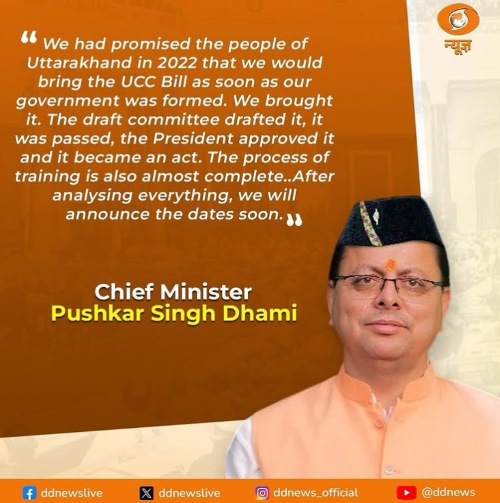Uttarakhand has carved his name in history by becoming the first state in India to implement the Uniform Civil Code (UCC). Starting today, January 27, 2025, the UCC will standardize personal laws related to marriage, divorce, inheritance, and more, irrespective of religion or community.
This landmark decision fulfills a key promise made by the BJP during the 2022 Uttarakhand Assembly elections and aligns with Prime Minister Narendra Modi’s vision of “One Nation, One Law.”
Read on to discover everything you need to know about Uttarakhand’s UCC, including its features, implementation timeline, impact, and controversies.
Why Did Uttarakhand Implement the Uniform Civil Code First?
Uttarakhand has made headlines by becoming the first state in India to implement the Uniform Civil Code (UCC), a landmark decision that promises far-reaching social, political, and legal implications. But why did this hill state take such a bold step?
Let’s explore the compelling reasons behind Uttarakhand’s move :
1. Uttarakhand's Demographic Diversity & Need for Unity
- Uttarakhand, with its multireligious population, has long faced the challenges of managing religious diversity in personal matters such as marriage, inheritance, and divorce.
- Implementing the UCC is seen as a vital step toward creating legal unity by ensuring that all citizens—regardless of their religion—are treated equally under the law.
- Key benefit: Reduces legal fragmentation by unifying personal laws for all citizens.
2. Championing Gender Equality Through the UCC
- One of the primary drivers for Uttarakhand’s UCC implementation is empowering women. Current personal laws across different communities often favor men, especially in areas like property inheritance and divorce.
- The UCC is designed to offer equal rights to women in all communities, ensuring fairness and justice.
- Key benefit: Women’s empowerment by eliminating gender discrimination in personal laws.
3. Promoting Secularism with a Common Legal Code
The UCC reflects the secular principles of the Indian Constitution, aiming to establish a common legal framework irrespective of religious beliefs. Uttarakhand’s adoption of this law aligns with the goal of minimizing religious influence in personal matters like marriage and inheritance, fostering a more unified, secular society.
- Key benefit: Reinforces secular values by ensuring religion does not dictate civil law.
4. A Bold Political and Social Reform
Uttarakhand’s government, led by the BJP, has demonstrated a clear political will to implement the UCC, reflecting the broader national agenda for legal reforms.
- By doing so, the state not only positions itself as a progressive reformer but also becomes a role model for other states to follow in modernizing legal systems.
- Key benefit: Shows political leadership in driving national legal reform agendas.
5. Reducing Social Polarization with Unified Laws
Uttarakhand has experienced growing social tensions over issues like interfaith marriages, inheritance disputes, and property rights, all influenced by religious personal laws.
- The UCC is a strategic solution to these challenges, promoting social cohesion and ensuring that all citizens are treated equally, regardless of their background.
- Key benefit: Reduces polarization and enhances social harmony across communities.
6. Responding to Public Demand for Reform
The UCC is being implemented as part of a broader public demand for a more equitable legal system.
- There is a growing call for legal reforms that ensure fairness, especially in matters like inheritance, marriage, and divorce.
- Uttarakhand’s decision directly addresses these demands by offering a fairer, unified approach.
- Key benefit: Meets public demand for fairer, simpler legal frameworks.
7. Uttarakhand Sets a Precedent for Other States
By implementing the UCC first, Uttarakhand is setting an important precedent for the rest of India. This bold step not only brings immediate legal reforms but also acts as a test case for the national debate on the Uniform Civil Code.
- If successful, Uttarakhand could pave the way for broader national implementation of the UCC.
- Key benefit: Acts as a model state for national legal reforms
What is the Uniform Civil Code?
The Uniform Civil Code (UCC) is a set of laws designed to replace personal laws based on religious scriptures and customs. It aims to promote equality and justice by applying the same rules to all citizens in matters like:
- Marriage and Divorce: Equal marriageable age, prohibition of polygamy, and restrictions on unfair practices like 'halala.'
- Inheritance: Gender-neutral inheritance rights for property and assets.
- Live-In Relationships: Legal safeguards for individuals in live-in relationships.
- Will Provisions: Simplified and inclusive rules for drafting wills, including unique provisions for defense personnel.
![]() Source: dailyissues3.com
Source: dailyissues3.com
What are the Key Features of Uttarakhand’s UCC?
Here is Uttarakhand’s UCC features in details:
| Feature | Details |
| Gender Equality | Equal rights for men and women in marriage, divorce, and property inheritance. |
| Marriage Registration | Mandatory for all marriages and live-in relationships to ensure legal recognition. |
| Digital Services | Online platforms established for seamless marriage registration. |
| Children’s Legitimacy | All children are treated as legitimate, irrespective of birth circumstances. |
| Defense-Specific Wills | Unique “privileged will” provision for defense personnel, allowing oral or written execution. |
What is the Timeline of UCC Implementation in Uttarakhand?
Here is the Timeline of UCC Implementations in Uttarakhand:
| Milestone | Date | Details |
| Cabinet Proposal | March 2022 | The Uttarakhand Cabinet approved the formation of an expert committee to draft the UCC. |
| Formation of Expert Committee | May 27, 2022 | Retired Supreme Court judge Ranjana Prakash Desai was appointed as the chairperson of the committee. |
| Draft Submission | February 2, 2024 | A comprehensive draft was submitted after extensive consultations across various communities. |
| Legislative Approval | February 2024 | The Uttarakhand Assembly passed the UCC Bill with overwhelming support. |
| Presidential Assent | March 2024 | President Droupadi Murmu gave her assent, paving the way for state-wide implementation. |
| Final Implementation | January 27, 2025 | Chief Minister Pushkar Singh Dhami declared this as the official implementation date. |
Why is the UCC Important for Uttarakhand?
UCC is important for Uttarakhand because for
- Promoting Gender Equality: Eradicates gender biases in personal laws.
- Simplifying Legal Processes: Eliminates the complexity of multiple personal laws, making legal proceedings smoother.
- Strengthening National Unity: Encourages a sense of inclusiveness among citizens.
Chief Minister Pushkar Singh Dhami’s Statement
- Chief Minister Pushkar Singh Dhami called the UCC a “historic step towards equality”, emphasizing that it was not aimed at targeting any community but rather ensuring justice and harmony in society.
- Dhami also attributed the BJP’s electoral success in Uttarakhand to its strong commitment to implementing the UCC.
![]() Source: .instagram.com/ddnews_official
Source: .instagram.com/ddnews_official
Public Reactions: Support and Criticism
Supporters’ Viewpoint:
- Gender Justice: Eliminates discriminatory practices like polygamy and unequal inheritance laws.
- Streamlined Legal Framework: A single set of laws reduces legal complexity and confusion.
- Unity in Diversity: Encourages inclusivity among diverse communities.
Critics’ Concerns:
- Cultural Interference: Critics argue it infringes upon the cultural and religious freedoms of certain communities.
- Insufficient Consultation: Some believe more public and community involvement was required during the drafting process.
- Implementation Challenges: Resistance from conservative sections of society may create hurdles.
How Uttarakhand Prepared for UCC Implementation
The state government adopted a phased approach to ensure smooth implementation:
- Expert Consultations: Justice (Retd.) Ranjana Prakash Desai’s committee consulted stakeholders, including religious groups, legal experts, and social organizations.
- Drafting the Law: A comprehensive four-volume draft was prepared, covering all aspects of personal laws.
- Public Awareness Campaigns: The government conducted awareness drives to educate citizens about the benefits of the UCC.
- Digital Infrastructure: Online portals were set up for efficient marriage registration and grievance redressal.
What’s Next?
- Uttarakhand’s successful implementation of the UCC may inspire other states to follow suit.
- As the debate over a nationwide Uniform Civil Code intensifies, Uttarakhand’s example will likely serve as a model for future initiatives.
States Watching Closely!
Several states, including Gujarat and Himachal Pradesh, have shown interest in exploring the implementation of a UCC.
Conclusion
The implementation of the Uniform Civil Code (UCC) in Uttarakhand is a historic step toward creating a more equitable society. While it has received both praise and criticism, its success will depend largely on effective execution and public acceptance.
As the first Indian state to embrace this progressive reform, Uttarakhand has set a precedent for the rest of the country. Whether this will lead to a nationwide Uniform Civil Code remains a critical question.
For more informations related to UCC, go the link given below:
Read| What is Uniform Civil Code?
Read| Uniform Civil Code and the Constitution: Historical background and Article 44
FAQs About Uttarakhand’s UCC
- What is the Uniform Civil Code (UCC)?
The UCC replaces religion-based personal laws with a unified set of rules for marriage, divorce, inheritance, and related matters. - Who drafted Uttarakhand’s UCC?
The draft was prepared by an expert committee chaired by Justice (Retd.) Ranjana Prakash Desai. - How does UCC affect marriage and inheritance laws?
It ensures gender equality by mandating equal inheritance rights and uniform marriage laws across all communities. - Will other states adopt the UCC?
Several states are closely observing Uttarakhand’s model, and discussions about a nationwide UCC are ongoing.


Comments
All Comments (0)
Join the conversation